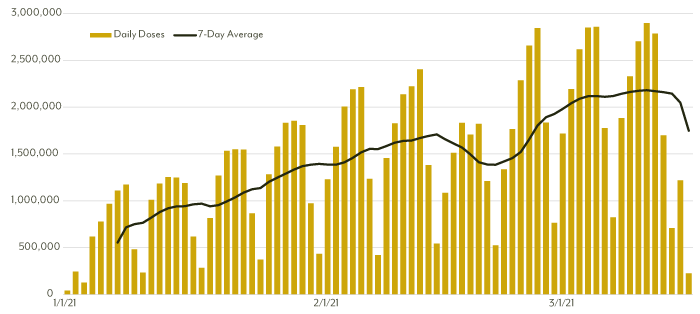Israel – The Gold Standard in Vaccination
With vaccine distribution under way globally, it’s interesting to look at different countries’ distribution methodologies and success stories. Israel is one country that seems to have gotten it mostly right, while other countries continue to struggle with vaccine availability and differing eligibility rules.
Israel did a phenomenal job with early and aggressive vaccine procurement, which is half the battle in a lot of countries. The country negotiated early with the three major suppliers at the time—namely Pfizer, Moderna and AstraZeneca. This ensured redundancy of supplies in case there were issues, as we are now seeing with the AstraZeneca vaccine. Israel is now preparing to secure supplies of booster doses for the future.
They also had an effective cold chain distribution system and used its military infrastructure to help distribute the vaccine across the country. More importantly, they have a compulsory insurance system—essentially nationalized health care—and therefore everyone was covered and traceable. Most processes are digitized. The combination of these factors has enabled Israel to vaccinate over 90% of its population over the age of 65. Their goal was to reach a 95% vaccination rate of people over age 50 by early March. As of March 16, roughly 60% of the country had been vaccinated with at least one dose, which is impressive.
Early indications suggest that infection rates and hospitalizations have also dropped significantly in Israel. Of course, one could argue that is the result of recent shutdowns, but the declining trend looked much steeper in the older population who were vaccinated early vs. younger people, who were vaccinated later through the duration of the lockdown.
Israel: New Hospitalizations for COVID-19 by Age

Source: Rossman, Shilo, Meir, Gorfine, Shalit & Segal (2021). Patterns of COVID-19 pandemic dynamics following deployment of a broad national immunization program.
The latest information published by Pfizer is very encouraging. In real world data, published by Israel’s ministry of health, after two weeks following the second dose, the vaccine effectiveness was 97% in preventing symptomatic disease, hospitalizations, severe and critical hospitalizations, and death. The vaccine was also effective at a rate of 94% in reducing asymptomatic infections—this is very important in halting spread of the virus. This study was done at a time when the more infectious U.K. variant was the dominant strain in the population.
Israel is nearly there—I imagine they will reach overall vaccination rates of 70% to 80%. At that point, the country can reopen in a meaningful way. In fact, they have begun to reopen using a staged approach based on local vaccination and infection rates. They have also implemented a QR coded system where you get a 6-month “pass” if you are vaccinated or recovered, which allows you to get into more restricted areas like indoor cafes, restaurants, gyms, swimming pools, for example. Others will be treated with bans on indoor dining and limited gathering. However, we must be careful in ensuring this two-tiered stick-and-carrot incentive system does not created inequalities. For example, minority populations who have fewer people vaccinated could be excluded from participating in reopening plans at a higher rate. The country will also implement a smartphone tracing system—albeit in a restricted fashion. In my opinion, the efforts described above are sound overall. The QR system could also be quickly standardized and used to open international travel.
The real test will be to observe Israel in terms of how they reopen schools, which are hotbeds for infection, particularly since we don’t have vaccines yet for younger people. The key to success in schools is also to reopen based on vaccination and infection rates, so we’ll see how it goes.
Regarding other countries, it’s really hard to compare to Israel. Israel has just 9 million people total. Try comparing that to more than 300 million in the U.S. As of March 16, the U.S. had vaccinated over 20% of the population with at least one dose. Even though the U.S. procured a lot of vaccine supply, the current levels are falling short. So we are having to ration out supplies to each state and ultimately the states are responsible for vaccinating people. This decentralized system is a real challenge. In the beginning, we saw bottlenecks, which are easing, but every state has its own way of deciding who can get vaccinated and when. So there is still a lot of confusion. The U.S. also faced manufacturing problems and issues with its cold storage network. More recently, it seems to be getting better and overall the U.S. has done a decent job for a country of its size.
U.S. COVID-19 Total Vaccine Doses Administered Daily

You can debate the pros and cons of a system such as universal health care, but without it, it’s difficult to identify patients and conduct contact tracing because many citizens aren’t even plugged into the health care network, which is basically the uninsured population.
In summary, the U.S. still faces a lot of hurdles, but I think over time, when supply catches up to increasing demand, we will be in a better position. Our trajectory might not be as fast as Israel’s in terms of reaching a certain level of immunity, but we’ll get there eventually. One of the silver linings to all of this is that, hopefully, the U.S. can improve its disease surveillance and public health crisis response. This could involve testing, contract tracing and keeping our diagnostic infrastructure up and running until the pandemic ends. We need to focus on vaccines, but we shouldn’t forget about the supporting infrastructure that contributes to our path to normalcy.
As of February 28, 2021, Diamond Hill owned shares of Pfizer, Inc.
The views expressed are those of Diamond Hill as of March 2021 and are subject to change. These opinions are not intended to be a forecast of future events, a guarantee of results, or investment advice.